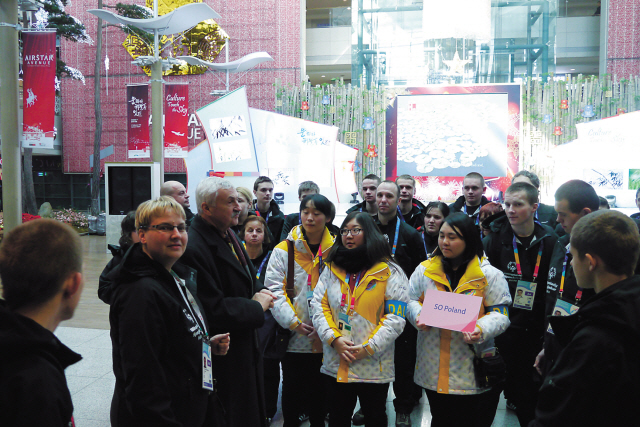The word “diplomacy” often conveys an image of stiff-collared old men in buttoned suits talking endlessly in puffed-up niceties.
But that out-of-date image gets upended by events like Special Olympics with its grassroots sports, health, educational and other programs for people with intellectual disabilities.
The Special Olympics World Winter Games opened here Tuesday, with more than 3,000 athletes and officials from 120 countries competing, and will conclude on Feb. 5.
It’s no wonder foreign envoys in Korea ― more than 40 ambassadors and high-level diplomats ― came out en masse to YongPyong Dome in Pyeongchang, Gangwon Province, on Tuesday for the opening ceremony of the Special Olympics.
But that out-of-date image gets upended by events like Special Olympics with its grassroots sports, health, educational and other programs for people with intellectual disabilities.
The Special Olympics World Winter Games opened here Tuesday, with more than 3,000 athletes and officials from 120 countries competing, and will conclude on Feb. 5.
It’s no wonder foreign envoys in Korea ― more than 40 ambassadors and high-level diplomats ― came out en masse to YongPyong Dome in Pyeongchang, Gangwon Province, on Tuesday for the opening ceremony of the Special Olympics.

Participating countries got a chance to talk directly to the Korean public during the Games about what they are doing back home to make their societies caring and inclusive, and to value human rights.
“The Special Olympics is an inspiring event, and is made all the more meaningful because it is coinciding with the 25th anniversary of the Americans with Disabilities Act,” said U.S. Ambassador to Korea Sung Kim. “This makes this year’s Special Olympics more significant. It is very exciting.”
The opportunity for public diplomacy during the Special Olympics gave even small embassies ― ones that otherwise would have few chances to communicate directly with the Korean public ― a broad international platform to show off shared values embodied in the inspirational stories expressed on faces of athletes competing in the Special Olympics.
“The Special Olympics uplifts Korea’s national image,” said Ma Young-sam, ambassador for public diplomacy at the Ministry of Foreign Affairs and Trade. “The Special Olympics itself gives a positive image of how Korea is inclusive and accommodating to people with intellectual disabilities.”
Most people are familiar with conventional diplomacy, the kind where stuffy old government elites talk directly to one another. Public diplomacy, the kind that uses sports, focuses on the ways in which a country communicates with citizens in other societies directly, bypassing government channels and leaders.
“It is important to give athletes challenged with intellectual disabilities an opportunity to participate in competitive sport at this high caliber. Everyone should get a chance like this,” said Zahmbulat Murzalin, counselor-general at the Kazakh Embassy in Korea.
Whether from Kazakhstan, Korea or the United States, Special Olympic athletes stand as inspirational messengers.
“It was great to participate in an event that underscored the spirit of solidarity with people with intellectual disabilities. All that we have done is still not enough but this event, which is a truly an ennobling endeavor, conveys the imagination and creativity required to do more,” said Tunisian Ambassador to Korea Mohamed Ali Nafti.
Ma said that in some ways hosting the Special Olympics was more positive and uplifting than hosting any other sports event, because of the message it sent.
“This event is more positive than other sports events in some ways because it sends the message: ‘We are a society that cares, that values these basic human rights,’ showcasing truly inspirational stories in every athlete these countries from all over the world send to Korea,” Ma said.
Barry Sanders, a communications professor at the University of California, Los Angeles, made the point in a publication called “Public Diplomacy in the News” that sports were a vehicle through which many messages hitch a ride. So, a well-conceived public diplomacy strategy could capitalize on the opportunities that sports present.
The Special Olympics is a case in point. The Special Olympics sent the message that Korea, indeed, all those nations that participated, value the inclusion of people with intellectual disabilities into society. The national images of those participatory countries are uplifted.
“I believe (Korea) demonstrated their capability of inclusion and their willingness to collaborate in that sense,” said Venezuelan Charge d’Affaires to Korea Yadira Hidalgo de Ortiz after attending the opening ceremony of the Special Olympics on Wednesday.
But the true test of public diplomacy is its effectiveness to influence public policy.
International leaders convened a global development summit Wednesday, on the sidelines of the Special Olympics, to discuss ways to better include intellectually disabled people in society.
Nobel Peace Prize laureate Aung San Suu Kyi spoke at the conference about ways the Special Olympics could influence developing countries to enact laws that protect the rights of people with intellectual disabilities.
“The ratification of the United Nations convention on the rights of persons with disabilities in late 2011 was a breakthrough,” Suu Kyi said.
“Of course, ratifying a convention is one thing complying with both its letter and spirit is quite another, but if Burma, until recently one of the most isolated and oppressed countries in the world, can start to acknowledge the rights of people with intellectual disabilities, every developing country should be able to do the same if not more.”
By Philip Iglauer (ephilip2011@heraldcorp.com)
-
Articles by Korea Herald







![[Graphic News] More Koreans say they plan long-distance trips this year](http://res.heraldm.com/phpwas/restmb_idxmake.php?idx=644&simg=/content/image/2024/04/17/20240417050828_0.gif&u=)
![[KH Explains] Hyundai's full hybrid edge to pay off amid slow transition to pure EVs](http://res.heraldm.com/phpwas/restmb_idxmake.php?idx=644&simg=/content/image/2024/04/18/20240418050645_0.jpg&u=20240419100350)






![[From the Scene] Monks, Buddhists hail return of remains of Buddhas](http://res.heraldm.com/phpwas/restmb_idxmake.php?idx=652&simg=/content/image/2024/04/19/20240419050617_0.jpg&u=20240419175937)

![[KH Explains] Hyundai's full hybrid edge to pay off amid slow transition to pure EVs](http://res.heraldm.com/phpwas/restmb_idxmake.php?idx=652&simg=/content/image/2024/04/18/20240418050645_0.jpg&u=20240419100350)

![[Today’s K-pop] Illit drops debut single remix](http://res.heraldm.com/phpwas/restmb_idxmake.php?idx=642&simg=/content/image/2024/04/19/20240419050612_0.jpg&u=)